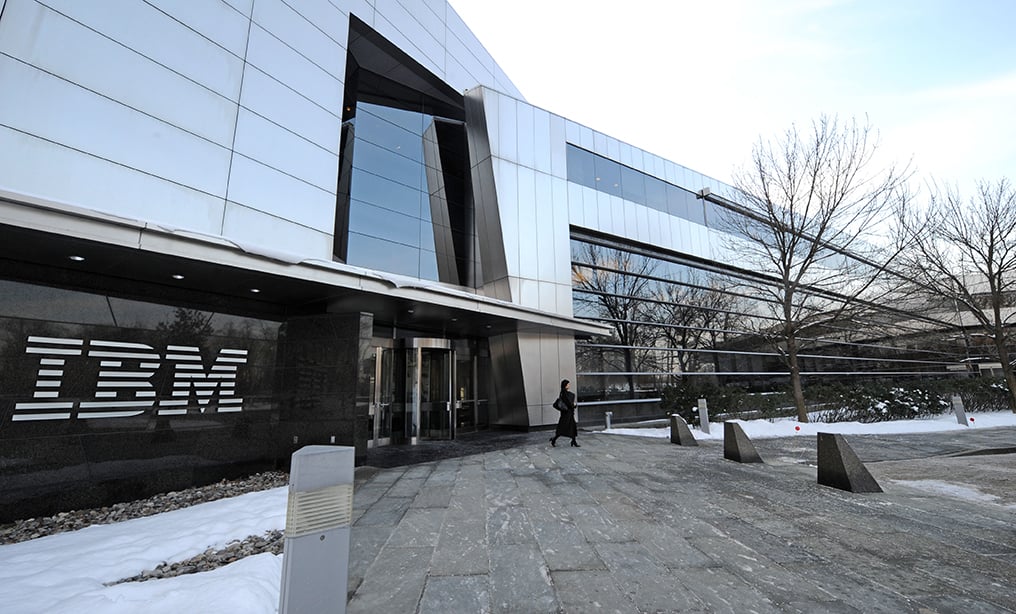IBM Licensing Contract Breach Suit Is Revived by Second Circuit
The technology company saw its $10 million IP contract breach win over United Microelectronics Corp. remanded to the district court for further review.
March 11, 2019 at 03:54 PM
3 minute read
 IBM headquarters in Armonk, New York. Photo: Louis Lanzano/AP
IBM headquarters in Armonk, New York. Photo: Louis Lanzano/AP
A $10 million licensing breach of contract dispute by IBM against Taiwan-based semiconductor company United Microelectronics Corp. will return to the district court for additional review, after the U.S. Court of Appeals for the Second Circuit partially reversed a trial court ruling in IBM's favor.
In September 2017, U.S. District Judge William Pauley III of the Southern District of New York granted IBM's motion for summary judgment over what the American tech giant claimed was UMC's breach of contract for failure to pay a $10 million intellectual property licensing fee.
The dispute arose out of UMC's agreement to identify and secure a majority ownership in a microchip manufacturing facility during the 2015 calendar year. Not only did UMC fail to make good on the facility part of the deal, the firm likewise did not pay an associated $10 million fee.
On appeal, the panel of Circuit Judges José Cabranes, Rosemary Pooler and Christopher Droney sided with the district court on the issue of breach of contract. Pointing to New York state law on contract language, the panel found there was no condition precedent agreed to between the two companies that supported UMC's claim that the $10 million was due only after the facility was secured.
“UMC took on the risk that it would be unable (or unwilling) to establish a subsidiary and named facility by December 31, 2015,” the panel wrote. “To infer a condition that shifts that risk, absent explicit language would be to impermissibly rewrite the parties' bargain.”
The panel parted ways, however, with the district court on the issue of just how much liability this agreement placed UMC under.
UMC contended on appeal that an amendment to the original agreement between the parties caps its liability at $2 million. IBM argued that because the amended contract language failed to directly and specifically refer to the $10 million obligation found in the original agreement, it should be presumed to be excluded from the lower liability cap.
The panel disagreed with the district court's reading in favor of IBM, finding it “reasonable” that the $2 million figure was agreed to by both parties as a protection against a breach. But since the language is ambiguous in its lack of specificity, the panel remanded the suit back to the district court to take up a review of extrinsic evidence to resolve the issue.
IBM was represented on appeal by Chaffetz Lindsey name attorney Peter Chaffetz. Blank Rome partner Salvatore Tamburo represented UMC. Neither responded to a request for comment.
Related:
Paul Weiss Scores Lead Role on IBM's $33B Red Hat Buy
Court Provisionally Compels Licensee to Submit to Software Audit
This content has been archived. It is available through our partners, LexisNexis® and Bloomberg Law.
To view this content, please continue to their sites.
Not a Lexis Subscriber?
Subscribe Now
Not a Bloomberg Law Subscriber?
Subscribe Now
NOT FOR REPRINT
© 2025 ALM Global, LLC, All Rights Reserved. Request academic re-use from www.copyright.com. All other uses, submit a request to [email protected]. For more information visit Asset & Logo Licensing.
You Might Like
View All


Law Firms Expand Scope of Immigration Expertise Amid Blitz of Trump Orders
6 minute readTrending Stories
- 128 Firms Supporting Retired Barnes & Thornburg Litigator in Georgia Supreme Court Malpractice Case
- 2Boosting Litigation and Employee Benefits Practices, Two Am Law 100 Firms Grow in Pittsburgh
- 3EMT Qualifies as 'Health Care Provider' Under Whistleblower Act, State Appellate Court Rules
- 4Bar Report - Feb. 3
- 5Was $1.3M in 'Incentive' Payments Commission? NJ Justices Weigh Arguments
Who Got The Work
J. Brugh Lower of Gibbons has entered an appearance for industrial equipment supplier Devco Corporation in a pending trademark infringement lawsuit. The suit, accusing the defendant of selling knock-off Graco products, was filed Dec. 18 in New Jersey District Court by Rivkin Radler on behalf of Graco Inc. and Graco Minnesota. The case, assigned to U.S. District Judge Zahid N. Quraishi, is 3:24-cv-11294, Graco Inc. et al v. Devco Corporation.
Who Got The Work
Rebecca Maller-Stein and Kent A. Yalowitz of Arnold & Porter Kaye Scholer have entered their appearances for Hanaco Venture Capital and its executives, Lior Prosor and David Frankel, in a pending securities lawsuit. The action, filed on Dec. 24 in New York Southern District Court by Zell, Aron & Co. on behalf of Goldeneye Advisors, accuses the defendants of negligently and fraudulently managing the plaintiff's $1 million investment. The case, assigned to U.S. District Judge Vernon S. Broderick, is 1:24-cv-09918, Goldeneye Advisors, LLC v. Hanaco Venture Capital, Ltd. et al.
Who Got The Work
Attorneys from A&O Shearman has stepped in as defense counsel for Toronto-Dominion Bank and other defendants in a pending securities class action. The suit, filed Dec. 11 in New York Southern District Court by Bleichmar Fonti & Auld, accuses the defendants of concealing the bank's 'pervasive' deficiencies in regards to its compliance with the Bank Secrecy Act and the quality of its anti-money laundering controls. The case, assigned to U.S. District Judge Arun Subramanian, is 1:24-cv-09445, Gonzalez v. The Toronto-Dominion Bank et al.
Who Got The Work
Crown Castle International, a Pennsylvania company providing shared communications infrastructure, has turned to Luke D. Wolf of Gordon Rees Scully Mansukhani to fend off a pending breach-of-contract lawsuit. The court action, filed Nov. 25 in Michigan Eastern District Court by Hooper Hathaway PC on behalf of The Town Residences LLC, accuses Crown Castle of failing to transfer approximately $30,000 in utility payments from T-Mobile in breach of a roof-top lease and assignment agreement. The case, assigned to U.S. District Judge Susan K. Declercq, is 2:24-cv-13131, The Town Residences LLC v. T-Mobile US, Inc. et al.
Who Got The Work
Wilfred P. Coronato and Daniel M. Schwartz of McCarter & English have stepped in as defense counsel to Electrolux Home Products Inc. in a pending product liability lawsuit. The court action, filed Nov. 26 in New York Eastern District Court by Poulos Lopiccolo PC and Nagel Rice LLP on behalf of David Stern, alleges that the defendant's refrigerators’ drawers and shelving repeatedly break and fall apart within months after purchase. The case, assigned to U.S. District Judge Joan M. Azrack, is 2:24-cv-08204, Stern v. Electrolux Home Products, Inc.
Featured Firms
Law Offices of Gary Martin Hays & Associates, P.C.
(470) 294-1674
Law Offices of Mark E. Salomone
(857) 444-6468
Smith & Hassler
(713) 739-1250







